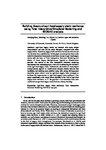Building theory of agri-food supply chain resilience using Total Interpretive Structural Modelling and MICMAC analysis
| dc.contributor.author | Zhao, G | |
| dc.contributor.author | Liu, Shaofeng | |
| dc.contributor.author | Lu, Haiyan | |
| dc.contributor.author | Lopez, Carmen | |
| dc.contributor.author | Elgueta, S | |
| dc.date.accessioned | 2019-03-13T16:52:37Z | |
| dc.date.issued | 2019-04-16 | |
| dc.identifier.issn | 2054-5819 | |
| dc.identifier.issn | 2054-5827 | |
| dc.identifier.uri | http://hdl.handle.net/10026.1/13464 | |
| dc.description.abstract |
Agri-food supply chains are inherent with some unique characteristics and that can be easily disrupted compared with other supply chains. Therefore, supply chain resilience factors are relevant and can be taken into consideration. In this paper an attempt has been made to build a theoretical framework of resilience factors in agri-food supply chains with the help of total interpretive structural modelling and matrix of cross impact multiplications applied to classification analysis. The results of the total interpretive structural modelling demonstrate that leadership plays a vital role in enhancing the resilience of the agri-food supply chain. Furthermore, the matrix of cross impact multiplications applied to classification analysis results indicate that leadership and working team stability along with strong driving power should be given critical focus by agri-food supply chain managers to facilitate the improvement of agri-food supply chain resilience. This paper contributes to the extant theory building in the field of agri-food supply chain resilience, to fill the gap that a few researches have been conducted on agri-food supply chain resilience theory building. | |
| dc.format.extent | 235-235 | |
| dc.language | en | |
| dc.language.iso | en | |
| dc.publisher | Inderscience Publishers | |
| dc.title | Building theory of agri-food supply chain resilience using Total Interpretive Structural Modelling and MICMAC analysis | |
| dc.type | journal-article | |
| dc.type | Journal Article | |
| plymouth.issue | 3/4 | |
| plymouth.volume | 4 | |
| plymouth.publication-status | Published | |
| plymouth.journal | International Journal of Sustainable Agriculture Management and Informatics | |
| dc.identifier.doi | 10.1504/IJSAMI.2018.099236 | |
| plymouth.organisational-group | /Plymouth | |
| plymouth.organisational-group | /Plymouth/Faculty of Arts, Humanities and Business | |
| plymouth.organisational-group | /Plymouth/Faculty of Arts, Humanities and Business/Plymouth Business School | |
| plymouth.organisational-group | /Plymouth/PS - Academic Partnerships | |
| plymouth.organisational-group | /Plymouth/REF 2021 Researchers by UoA | |
| plymouth.organisational-group | /Plymouth/REF 2021 Researchers by UoA/UoA17 Business and Management Studies | |
| plymouth.organisational-group | /Plymouth/Users by role | |
| plymouth.organisational-group | /Plymouth/Users by role/Academics | |
| dcterms.dateAccepted | 2019-03-01 | |
| dc.rights.embargodate | 2020-4-15 | |
| dc.identifier.eissn | 2054-5827 | |
| dc.rights.embargoperiod | Not known | |
| rioxxterms.version | Accepted Manuscript | |
| rioxxterms.versionofrecord | 10.1504/IJSAMI.2018.099236 | |
| rioxxterms.licenseref.uri | http://www.rioxx.net/licenses/all-rights-reserved | |
| rioxxterms.licenseref.startdate | 2019-04-16 | |
| rioxxterms.type | Journal Article/Review |


